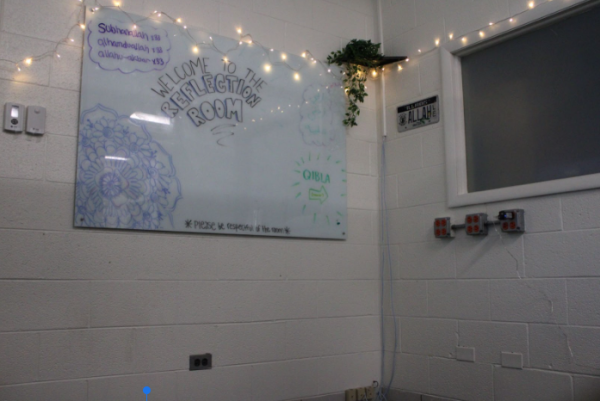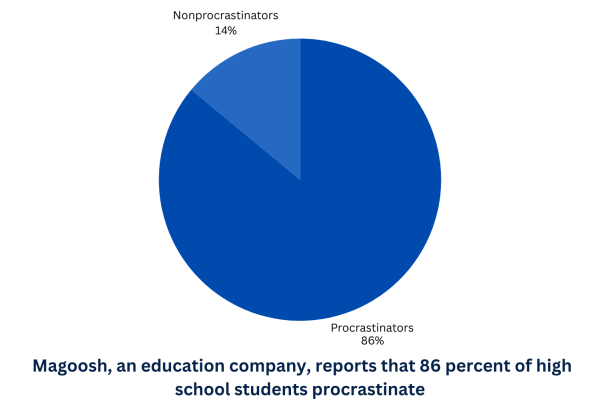Give Students a Break
MENTAL HEALTH DAYS :
High school is hard. Five days out of the week, students are expected to come to school for more than seven hours a day, be given assignments and then return home, only to spend a few more hours doing schoolwork. The work can stack up, creating a great amount of stress. Sometimes, it’s nice to be granted a break.
A mental health day, in a school setting, is when a student or teacher takes a day off for reasons other than a physical illness. They may spend this day renewing their energy and relieving their stress. Many people, including members of the Drops of Ink staff, have differing opinions on whether mental health days should be allowed at school.
Some Drops of Ink staffers feel that mental health is just as equal as physical health, and it should be treated as such. Not allowing students to take days off for their mental health only perpetuates the negative stigma surrounding mental illness. Mental health days don’t just have to be for people struggling with a mental illness, but they can also be for anyone who is feeling overwhelmed. We all get homework, which means we all get stressed, and on occasion, deserve a day off.
Should a student ignore their stress and still come to school, it could negatively affect their performance. They might not be able to focus on the lessons, and not being able to function properly can only make them feel worse until they begin to start slacking off on each of their assignments. Students who are unwell begin to only live for the weekends — when they are free from the additional work — which is no way to live. Having a mental health day to rest can clarify a student’s mind and refresh them, helping things fall into place, including their grades.
However, some of our staff believes mental health days might do more harm than good. Their number-one reason for this is the amount of learning and work they are going to miss if they take a day off. If you skip school to catch up on your assignments and relieve stress, doesn’t missing a day only add to both of those things? While that may not be the intention, it could defeat the purpose.
Some DOI members argued that students should not be allowed to miss school to focus on their mental health because it is not the same as their physical health. When you are sick, you are taken out of school because you are contagious, and you don’t want to infect the other kids. Mental health isn’t contagious, and therefore shouldn’t be treated the same.
Should the school realize the power of mental health days, when should they happen? Is it up to the student to decide when he/she should have a day off for their mental health or should the school set aside specific days in the school year for a schoolwide day off? The DOI staff argued for both sides.
One side said that it should be up to the individual because mental health is personal and tailored to each person differently. If there aren’t built-in mental breakdowns, there shouldn’t be built-in mental health days.
The other side of the argument said that since missing school isn’t ideal, having already designated days might help fix the problem of extra stress and homework. One blanket day can eliminate any consequences a student may have to face after taking a mental health day.
Another potential solution provided was to have no-school days maybe once a month, once a semester or after busy weekends, such as school dances, to restore vitality.
NO-HOMEWORK DAYS:
Schools around the world have begun to implement no-homework days into their schedules to give their students a much-needed break from schoolwork. Finland, ranked as having the best educational system in the world by Scholastic, does not give their students homework. That’s obviously not the case at LHS. However, if LHS is nationally ranked, why don’t students feel more cared for?
Having no-homework days would allow kids to spend a few hours a day or a weekend doing things they love. High school is a time to explore interests and learn what we are passionate about, but it’s hard to do that if we are cooped up in room spending hours on homework. The time teenagers spend doing homework could be used for spending time with family and friends, relaxing, or doing things they love. Not being constantly at work could strengthen relationships and improve general wellness. One DOI staffer pointed out that the school needs to realize there is more to life than spending six hours on homework outside of school.
Some members said that there would be a slim chance of the school establishing no-homework days because our school is recognized by colleges for its intensive program and prestige. Allowing students to skip out on homework for a day or weekend could make our school look soft in a sense and could potentially harm students once we reach an advanced college curriculum. Plus, if students sign up for higher-level courses, they should expect the loads of homework they will receive.
SCHOOL’S JOB:
While there are varying viewpoints on the benefits and drawbacks of days without school or homework, the staff of Drops of Ink was unanimous in this decision: high schoolers are stressed, sometimes beyond the point of what they can handle, regardless of if they are in regular or AP courses.
LHS can and should play a role in helping manage this stress in and outside of the classroom. This can occur by allowing students to take mental health days with minimal consequences. The first step is to understand the reasons a student may be taking the day off. This can be done with the help of the student’s LST and communication between the student and their social worker or counselor, for instance. Another recommendation by staff members was allowing students a mental health period, in a place like their LST, as a way to restore their energy without missing a full day.
Outside of the LST, teachers can support students as well by limiting the amount of coursework they give each night. As most teachers realize, students are taking up to six classes a day, meaning that their class is not the only one students have homework in. That is not to say a teacher should avoid giving homework completely but rather to be considerate and aware of this other homework.
Additionally, the DOI staff feels that there should also be ongoing communication between teachers and students. Creating a relationship not only helps the student to be heard and makes the class more meaningful for them, but it helps to build a mutual trust and respect between teachers and students, which could benefit both parties. If a student is having a rough week, teachers could try to empathize with a student and maybe provide an extension on a large assignment, or they could exempt homework given while a student is taking a mental health day. Now, there is always the chance that students could possibly take advantage of these options, but this should not be the only factor limiting the implementation of these options in the classroom.
Similar to the options provided for mental health days, staff members suggested we have no-homework days on weekends during school dances or other big events, weekends with holidays, or once a week or once a semester. No-homework days could even eliminate built-in mental health days, considering that a lot of stress comes from schoolwork. If the school decides to give no-homework days, then teachers shouldn’t pile on homework and tests the day before or the day after to compensate for the lost day. A break from homework truly needs to be a break.
Although high school can be full of stress, there can be some things done to give students a break and ease up on the pressure that constantly strains students’ lives.












